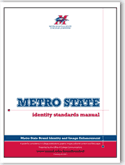General Terms
African American
No hyphen. This Metro State style guideline overrules AP style where African American is hyphenated.
Dates
When a month is used with a specific date, abbreviate the following: Jan., Feb., Aug., Sep., Oct., Nov. and Dec. Spell out the month when using it alone, or with a year alone.
Illegal alien
Use “unauthorized immigrant” rather than illegal alien.
Minority, minorities
Use “of color” or “diverse ethnic backgrounds” instead of ethnic minority (ies). Only use “minority” when it is part of an official title or name.
Example: Metro State has the largest number of students of color of all Colorado’s higher education institutions. Or, Metro State’s goal is to increase the number of faculty from diverse ethnic backgrounds.
Numerals
Spell out whole numbers from one to nine; use figures for numbers 10 and above. Example: The seminar has eight women and 12 men.
Use numerals, even if the number is below 10, for ages, credit hours, days of the month, degrees of temperature, dimensions, figures with decimals, latitude and longitude, measurements,
page numbers, percentages, room numbers, sums of money and times of day.
Spell out the word million.
Example: The grant was for $3 million. Colorado’s population is 4.3 million.
Never begin a sentence with a numeral; spell out the numeral or recast the sentence. The only correct use of a numeral to start a sentence is when citing a calendar year. Examples: 1958 was a memorable year. Twenty-two students organized the bake sale. Last year 117 employees were hired.
Telephone numbers
Do not use parentheses for area codes. Use dashes to separate the elements.
Example: 303-556-1212.
Time of day
Do not use :00 for times that fall on the hour, except in formal invitations. Use lowercase for a.m. and p.m., with periods after each letter and no space between.
Examples: 8 a.m., 6 p.m., 7:30 p.m.
Use a hyphen with no spaces when indicating a time span. When indicating a time span with both times falling within either a.m. or p.m., list a.m. or p.m. just once at the end.
Examples: 8:30 p.m.-1 a.m., 9-11 a.m., not 9 a.m.-11 a.m.
Use midnight and noon, not 12 a.m. and 12 p.m. or 12 midnight and 12 noon.
Be careful of redundancies. Incorrect: 10 a.m. this morning. Correct: 10 a.m. today.
Web terms
The terms Web and Internet are generally capitalized, even in compound words.
Examples: a Web page; my Web site; on the Internet.
Exceptions are webcam, webcast, and webmaster. Lowercase is preferred for most other terms, such as home page. The word e-mail is always hyphenated. The word online is not hyphenated.
Other examples of the preferred forms for Metro State written communications are as follows: ASCII, CD-ROM, database, fax, home page, multimedia, the World Wide Web.
When spelling out Web addresses, underline. If www is part of the address, do not precede with http.
Right: www.mscd.edu.
Wrong: http://www.mscd.edu.
Times and dates
Do not add the ordinal suffix (1st, 2nd, 3rd, 15th) to the day of the month.
Example: He will arrive on March 26 (not March 26th).
In a complete date, the year should be set off in commas. In a partial date, the year is not set off in commas.
Examples: On June 30, 2004, the fiscal year ended. Classes will resume in August 2005. What began in spring 2003 ended in summer 2004.
Punctuation
Commas
In a series of three or more items, do not use a comma before the final conjunction (and/or), unless it is needed for clarity and ease of reading.
Example: He has classes in chemistry, psychology and music.
Hyphens
Hyphenate compound adjectives when they precede the noun thatthey modify.
Examples: off-campus party; 14th-century art.
Do not hyphenate them when they stand alone.
Example: She lives off campus.
Also, do not put a hyphen between an adverb ending in -ly and the adjective
it modifies.
Example: a newly furnished office.
Semicolons
Use a semicolon in a series of items if one or more of the items in the list contains a comma.
Example: Be sure to bring warm clothes; something to read, such as a good book; and a good umbrella, just in case it rains.
Colons
Capitalize the first letter after a colon only if it is the beginning of a sentence that could stand alone.
Example: Remember this: The only thing you really need is confidence.
Exclamation points
Avoid exclamation points unless they are truly used as part of an exclamation. It is always better to write forcefully to convey enthusiasm rather than to load your copy with exclamation marks.

